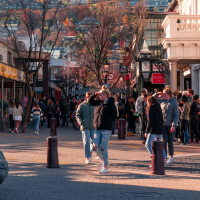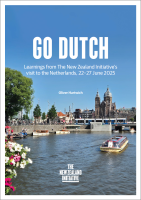Grocery reform or procedural tweak
The Government deserves credit for wanting to make it easier for new supermarkets and other large projects to get off the ground. The Government’s broad approach is sound. Read more

The Government deserves credit for wanting to make it easier for new supermarkets and other large projects to get off the ground. The Government’s broad approach is sound. Read more
Prime Minister Christopher Luxon this week opened the door to asset recycling. He suggested that the government could sell state-owned enterprises and commercial assets it no longer has any reason to own, to fund new infrastructure. Read more
Wellington (Thursday, 13 November 2025) – The New Zealand Initiative welcomes Parliament’s enactment today of the Regulatory Standards Bill. The Bill requires the government of the day to be much more transparent to Parliament than before about why it is asking Parliament to pass laws and regulations. Read more

The population of South Korea is about 51 million. In a hundred years, it will likely be about 11 million – a reduction of about 80%. Read more
Wellington (Thursday, 13 November 2025) - A new report from The New Zealand Initiative says New Zealand can learn from Dutch pragmatism, competence and cooperation. Go Dutch: Learnings from The New Zealand Initiative's visit to the Netherlands follows the Initiative’s 2025 study tour of 42 business and civic leaders. Read more
Dr Oliver Hartwich spoke about the New Zealand Initiative's recent delegation trip to the Netherlands at a Dutch Business Association event, presenting the Initiative's report on how Dutch culture and pragmatism shape policy approaches. Dr Hartwich explained how the delegation's visit to Amsterdam's deregulation authority influenced the passing of New Zealand's regulatory standards bill, with Dutch officials describing the controversial legislation as "common sense". Read more

New Zealand can learn from Dutch pragmatism, competence and cooperation. Go Dutch: Learnings from The New Zealand Initiative's visit to the Netherlands follows the Initiative’s 2025 study tour of 42 business and civic leaders. Read more
Last month, EU Commission President Ursula von der Leyen presented her plans for 2026 to the European Parliament. She promised the continent would become the “master of its own destiny”, build its own armies, control key technologies and lead the green transformation without depending on America or China. Read more
In just two school terms, something remarkable has happened in New Zealand’s primary classrooms. According to data from the Education Review Office, the proportion of students meeting curriculum expectations for phonics knowledge after 20 weeks of schooling has increased from 36 percent to 58 percent, with those exceeding expectations more than doubling. Phonics knowledge is not itself reading, but it is an important first step. Read more
After over 16 years as a GP, I can tell you what keeps me up at night. It is not the long hours or the difficult diagnoses. Read more
A commissioned report released this past week revealed a fact you may find surprising. Rules stopping a stadium from hosting many events cause an enormous amount of forgone revenue over time. Read more
Earlier this week, teachers’ unions accused Minister of Education Erica Stanford of a “blatant power grab.” This followed Stanford’s announcement that the Teaching Council will no longer set professional standards for teacher training. The Ministry of Education will take over this responsibility. Read more
On his show on Newstalk ZB, Mike Hosking discussed Dr Michael Johnston's reception as a guest speaker at a recent education conference, where he faced an unprofessional response from teachers and unionists. Hosking and his guests Tim Wilson and Kate Hawkesby criticised the behaviour as childish, with Wilson praising Dr Johnston for continuing to deliver his speech. Read more
In this episode, Oliver talks to Dr Prabani Wood about her research note "Better health through better data", which examines how New Zealand's fragmented health data systems prevent policymakers from knowing whether their decisions actually improve health outcomes. They discuss Dr Wood's recommendation for a Canadian-style primary care data network that would enable practitioners to improve their performance while giving policymakers the evidence they need to make better funding and policy decisions. Read more
Dr Michael Johnston talked to Sharon Brettkelly on RNZ's The Detail about his role in the Curriculum Coherence Group and the public reaction to the draft curriculum refresh. Dr Johnston addressed criticisms of the knowledge-rich approach, defended the balance of New Zealand and international content, and argued that a knowledge-rich curriculum would help address equity gaps in education outcomes. Read more